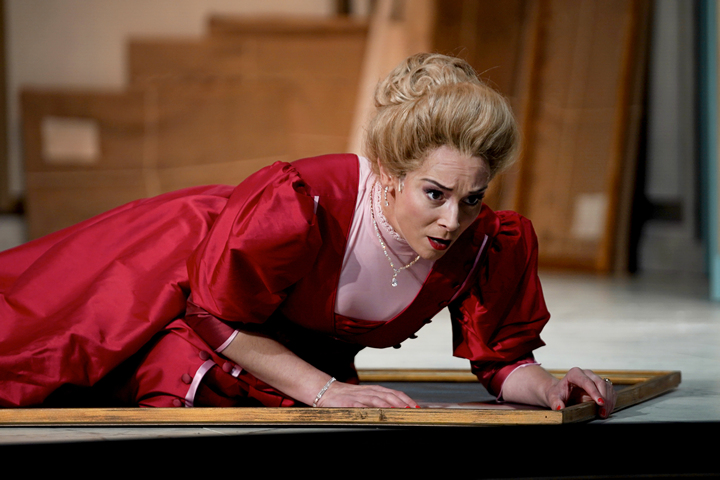| Opera Reviews | 27 April 2024 |
A Rodelinda worth waiting forby Catriona Graham |
|
Handel: Rodelinda
|
|

|
|
|
The curtain rises on Göttingen’s Covid-postponed International Handel Festival with Rodelinda, premiered at the Deutsches Theater and, an hour or so later, on ARTE Concert. The opera has a special significance as the founding performance of the Festival in 1920. Unsurprisingly, therefore, the action is updated to that period, and it is an elegant production. The set is a large, well-proportioned room, with a marble fireplace facing the audience, sparsely furnished with a sofa and two matching armchairs, and a low table. Paintings are propped against the walls and, during the overture, Rodelinda, her son Flavio and sister-in-law Eduige, all stony-faced, hand sword and sceptre over to Grimoaldo, who has taken power and imprisoned them. But this is Handel’s most grown-up opera. Here are no alarums and excursions, monsters and special effects that demand the Netflix treatment, or unrequited lusts, just the deep, enduring love of a well-suited, long-married couple. Only, Rodelinda knows that her husband Bertarido is dead, and Grimoaldo (Thomas Cooley) seeks to usurp more than Bertarido’s throne. The pain of her sorrow is etched in every note Anna Dennis sings. It is a wonderfully understated performance. Dennis is cool, contained, trusts the words and music to do the heavy emotional lifting, which makes it all the more effective when her character’s composure cracks. It also makes a good contrast with the more volatile and restless Eduige, played by Franziska Gottwald with quick movement and gesticulations. She, formerly betrothed to Grimoaldo is now being pursued by his sidekick Garibaldo. Julien Van Mellaerts is stylish, an aspiring Bond villain in this role, gleefully threatening the three prisoners at various times with death by the sword, and viciously attacking Unulfo (Owen Willetts), Bertarido’s loyal counsellor. For Bertarido is not dead, and these are not his ashes in the blue urn on the mantelpiece. As Bertarido, Christopher Lowrey is anguished overhearing what he thinks is Rodelinda’s inconstancy, tortured as he almost reaches out to touch her from his hiding-place behind a chair. There are some glorious moments. Dove sei, amato bene after Bertarido reads the writing on the urn; in the duet Io t'abbraccio with its insistent rhythm, Dennis’ and Lowrey’s voices are perfectly matched, balanced and blending; Bertarido’s scene with his sister, singing E la mia vita gia ti costa un sospiro; no upper lip is stiffer than Rodelinda’s in Se ‘l mio duol non è si forte as, yet again, she concludes that her husband is dead. Conductor Laurence Cummings gives the music space, with judicious use of silence. Director Dorian Dreher and Hsuan Huang (staging and costumes) make this an unfussy production, though there are reservations about what looks like the back end of an elephant crashing through the wall beside the fireplace. Markus Piccio’s lighting is similarly restrained, with an interesting use of blue light to convey Grimoaldo’s fantasy about Rodelinda in Prigioniera ho l’alma in pena. In the pit, the FestSpielOrchester play with their customary delicacy and precision, the solo instruments duetting with singers a particular delight, as also the echo in Con rauco mormorio. It may have been delayed, but this production was worth waiting for. |
|
Photo © Alciro Theodoro da Silva |
|







